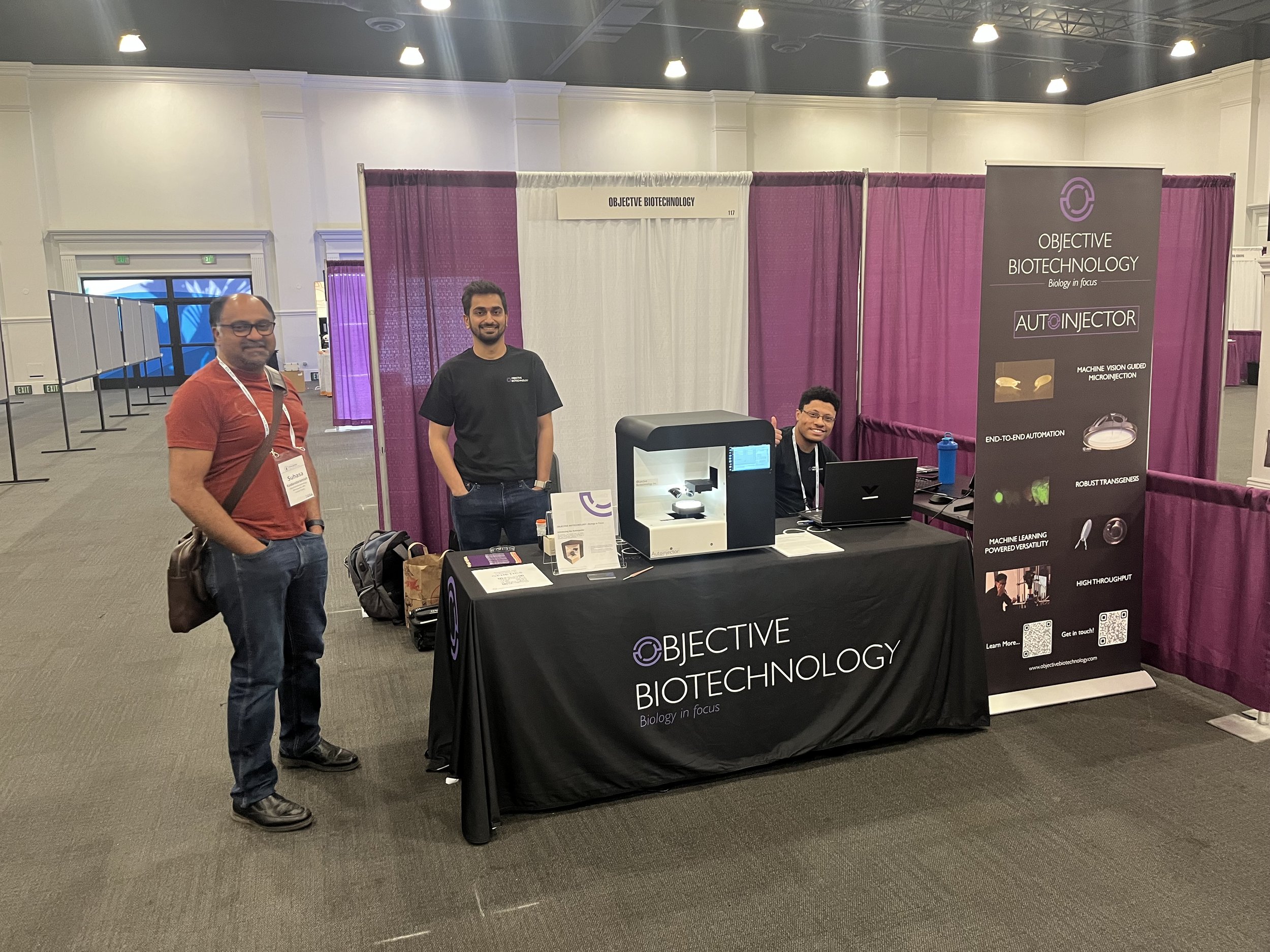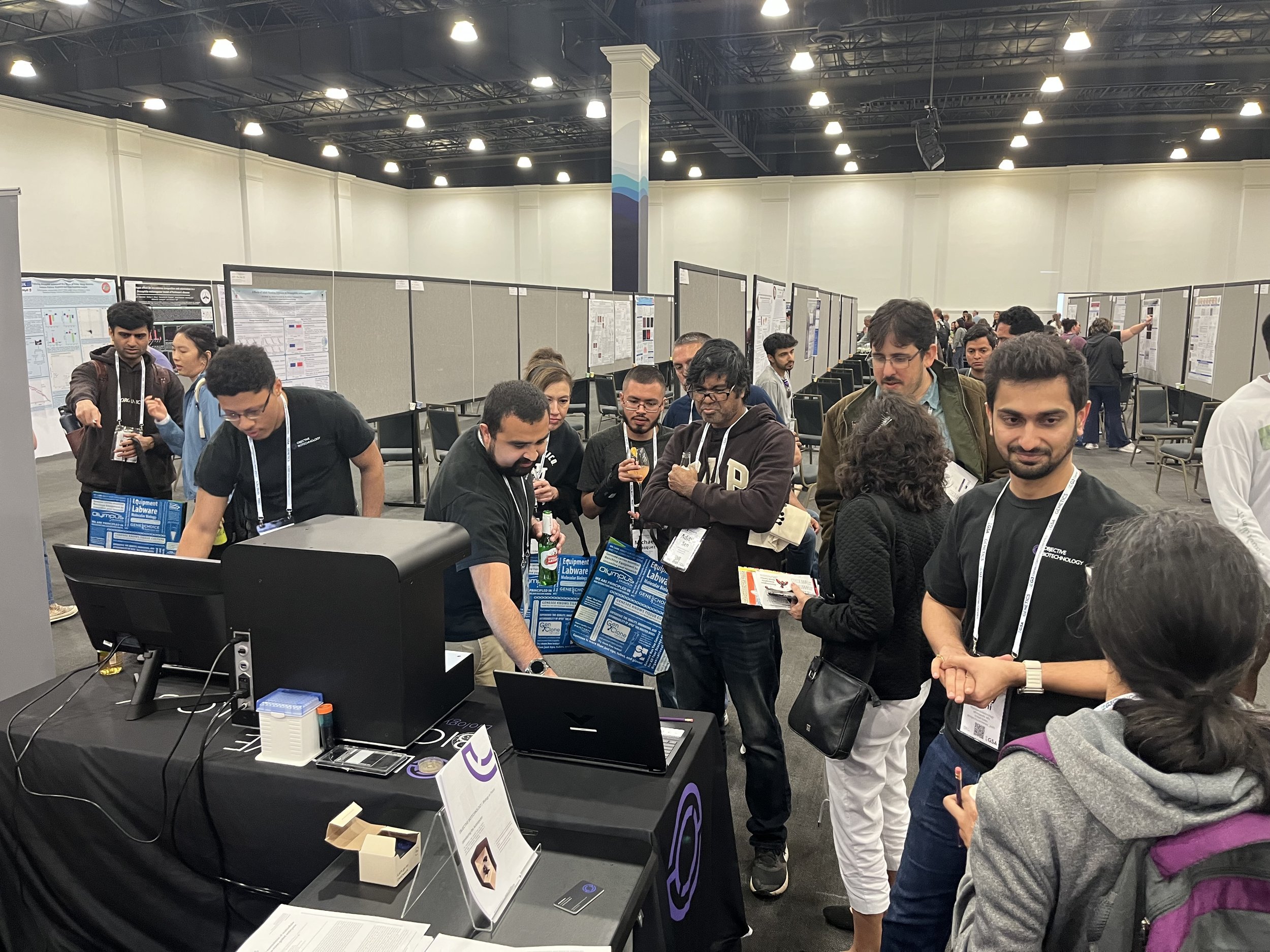Autoinjector
|
66th Annual Drosophila Research Conference
|
Autoinjector | 66th Annual Drosophila Research Conference |
Minneapolis, MN 04/10/2025 – Objective Biotechnology, in collaboration with researchers from the University of Minnesota, has developed a cutting-edge robotic system designed to automate the microinjection process used in genetic modification protocols for tiny model organisms. The system leverages machine learning and computer vision to perform embryo injections with unprecedented speed and precision, transforming the efficiency and accessibility of genetic research.
The technology, known as the Autoinjector, allows laboratory technicians to conduct consistent, high-quality microinjections in a fraction of the time previously required. Training can now be completed in weeks rather than months. This system has already shown successful outcomes in gene editing and transgenesis experiments across insect and vertebrate models at multiple early access sites in 2024.
Designed through a collaboration between the University of Minnesota’s Bio-Robotics and Biosensing Laboratory and the University of Minnesota Genomics Center (UMGC), the prototype has already demonstrated promising results. The research, titled “High-throughput genetic manipulation of multiphasic organisms by a camera-vision guided embryonic microinjection machine,” was published in the April 2024 edition of GENETICS, an online journal dedicated to cutting-edge genetics research.
The Autoinjector, commercially launched at the 66th Annual Drosophila Research Conference in San Diego from March 19-23, 2025, is currently available for purchase directly from Objective Biotechnology. www.objectivebiotechnology.com
“We believe that this automated platform will significantly advance the field of genetic modification by improving consistency, reducing training time, and enabling researchers to focus on their scientific discoveries rather than the technical challenges of manual microinjection,” said Suhasa Kodandaramaiah, professor of mechanical engineering at the University of Minnesota and senior author of the study.
“This technology is a game-changer, particularly for labs working with a wide range of species,” added Daryl Gohl, assistant professor at the UMGC’s Innovation Lab and Department of Genetics, Cell Biology, and Development. “The ability to rapidly and reliably inject embryos for gene editing applications is going to drastically streamline research in both basic and applied genetics.”
The Autoinjector also holds promise for applications beyond gene editing. According to Kodandaramaiah, the system could play a critical role in conservation efforts by aiding in the cryopreservation of endangered species: "The ability to maintain genetic diversity through cryopreservation, combined with gene editing capabilities, could help prevent the extinction of vulnerable species."
The instrument will come with pre-loaded injection methods for widely used research organisms, such as Drosophila and zebrafish, and can be fully adapted to meet the needs of emerging species in new research areas. This flexibility positions the Autoinjector as a powerful tool for researchers studying disease vectors and invasive pests, particularly mosquitoes and aquatic species.
“We’re excited to engage with laboratories around the world that work with a variety of model systems and disease vectors,” said James Grabau, CEO of Objective Biotechnology. “There is a growing need for a universal microinjection instrument that can meet the challenges posed by both traditional and emerging research species. Our system is designed to provide researchers with a reliable, high-throughput solution to genetic modification.”
The Autoinjector’s represents a significant step forward in the field of genetic research, offering increased throughput, consistency, and accessibility for researchers globally.
For more information on the Autoinjector, or to schedule a demonstration, please visit www.objectivebiotechnology.com or contact
James Grabau
CEO Objective Biotechnology.
jgrabau@objectivebiotechnology.com
__________________________________________________________________
About Objective Biotechnology
Objective Biotechnology, based in Minneapolis, MN, is a leader in the development of innovative solutions for genetic engineering and gene editing applications. The company’s mission is to accelerate scientific discovery through the commercialization of cutting-edge technologies that empower researchers to overcome the technical challenges of modern genetics.
About the University of Minnesota
The University of Minnesota is a world-class public research institution dedicated to advancing knowledge in science, engineering, and technology. The university’s Bio-Robotics and Biosensing Laboratory and Genomics Center are at the forefront of developing novel tools and methodologies for genetic research and biomedical applications.






